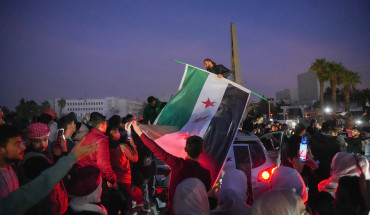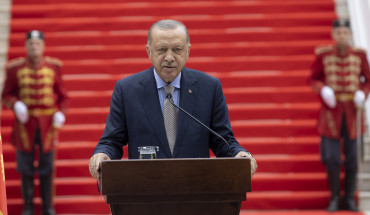The Iraqi government has approved Tehran’s controversial ambassador pick to represent the Islamic Republic in Baghdad, the Iranian media reports. According to Fars News Agency, an outlet affiliated with the Islamic Revolution Guards Corps (I.R.G.C.), the government of Prime Minister Haider al-Abadi yesterday officially announced that it would accept Quds Force Commander Brigadier General Iraj Masjedi as Tehran’s new envoy to Baghdad. Masjedi will be Iran’s third ambassador in Iraq since the U.S. military intervention toppled the government of Saddam Hussein in 2003. He will replace Hassan Danaeifar, who has served as Tehran’s ambassador to Baghdad for more than six years. All the three Iranian ambassadors in post-Saddam Iraq have been senior members of the I.R.G.C.’s elite Quds Force – reinforcing the notion that the I.R.G.C., rather than the civilian government in Tehran, is in charge of the Islamic Republic’s policies in regional countries.
The Iranian media first reported on Masjedi’s appointment almost two months ago. He confirmed his nomination in a speech on January 14 but added that the decision was not finalized. The announcement provoked concerns in Washington and in Sunni Arab states because of the Quds Force commander’s subversive role in regional conflicts. Thamer al-Sabhan, the Saudi minister of state for the Gulf region, for example, blasted Tehran for appointing “a war criminal and [one of the] world’s wanted men as its envoy in Iraq.”
The Quds Force, a U.S.-designated terrorist entity, is the I.R.G.C.’s secretive branch that is responsible for external operations and trains and arms terrorist and sectarian groups across the Middle East.
Masjedi’s role in Iraq since 1980s
While there is little information about Iraj Masjedi in the Western media, a survey of the Iranian press shows that he has played a key role in the Syrian and Iraqi wars as a senior aide to Quds Force Commander Major General Qassem Soleimani.
Masjedi, born in Iran’s Khuzestan Province bordering Iraq, has served in the I.R.G.C. for 35 years. His military role in Iraq dates back to the Iran-Iraq war in the 1980s, when he served as the chief of staff of the I.R.G.C.’s Ramazan Base outside the country under the leadership of I.R.G.C. commander Mohammad Bagher Zolghadr. The Ramazan Base was a central operational headquarter of the Quds Force and played an instrumental role in equipping, training and leading anti-Saddam Iraqi militant groups such as the Badr Brigade. He was later promoted to the chief commander of Ramazan Base. In a recent speech, Masjedi stated: “The Ramazan Base was established during the [Iraq] war to conduct asymmetric, guerrilla, intelligence and special operations and work with Iraqi movements and mujahedin groups.” He added that Quds Force operatives are doing the same job today in Iraq, Syria and beyond. According to experts of Iranian military affairs, Masjedi’s external operations experience during the 1980s qualified him to play a major role in Quds Force operations in Iraq after 2003.
Support for Regional Proxies
Masjidi has repeatedly argued that the I.R.G.C. is fighting in neighboring countries to prevent terrorist groups and Iran’s enemies from threatening Iran’s national security. “Aleppo, Fallujah and other regions in Syria and Iraq are the front line of the Islamic Resistance,” he said last June, and added that “the fight in Syria and Iraq serves to defend our country’s borders.” In another speech earlier this years, Masjedi claimed credit for organizing and supporting regional sectarian militiamen to fight Iran’s wars in the Middle East. “The front line for our combatants in the past [Iran-Iraq war] was Abadan and Khoramshahr and Mehran and Haj Imran; and now it is Mosul, Lebanon and Aleppo and Syria.” He further noted: “Today, the militants of Islam have stopped the enemy in other countries and with the help of popular forces in Iraq and Syria and regional mujahedin and armies such as Fatemiyoun [Afghan Shiite combatants], Zainabyoun [Pakistani Shiite militants] and Haidaryoun (Iraqi Shiite groups) within the framework of a great international power and alliance to fight against the Takfiri enemy.”
Masjedi has also credited Soleimani’s “bravery” and leadership for organizing and empowering “resistance movements” in the region and has called the Lebanese Hezbollah one of “the Islamic Revolution’s children.”
I.R.G.C.’s Growing Influence in Iraq
The appointment of Masjedi to Baghdad will further consolidate Iran’s influence in Iraq. With decades of experience in Iraq, Masjedi has the ability not only to bring Baghdad closer to Tehran diplomatically, but also to use I.R.G.C.’s decades-long links with Iran-supported Iraqi sectarian groups to make Baghdad a more pliant partner at the expense of Iraq’s stability and the interests of the United States and its regional allies. When Masjedi’s appointment was first announced, Atheel al-Nujaifi, the former governor of Iraq’s Nineveh Province, said the Quds Force commander’s role in Iraq will not be confined to diplomatic efforts, but that Masjedi’s military experience will elevate “Iran-Iraq relations to another level.”
His appointment also indicates that the I.R.G.C. will continue to design and implement Iranian policies in Iraq. “The new appointment and background of Mr. Masjedi in Sepah’s [I.R.G.C.] Quds Force reinforce the notion that Iranian ambassadors to Iraq implement Sepah’s plans in Iraq rather than follow the policies of the Iranian government and Foreign Ministry,” a BBC Persian analysis piece noted. Javad Mansouri, a former I.R.G.C. commander, also recently stated: “Our ambassador in Iraq and previous ambassador are members of the Quds Force. It is the same in Lebanon and Syria.”
The outgoing Iranian envoy to Baghdad Danaeifar was also a Quds Force operative. He had served as deputy head of the I.R.G.C. Navy and as the commander of I.R.G.C.’s Khatam al-Anbiya Construction Headquarter. He played a key role in the expulsion of Iranian opposition group Mujahedin Khalq (MEK) from Iraq. In 2007, General David Petraeus, the top U.S. military commander in Iraq at the time, alleged that Hassan Kazemi-Qomi, Iran’s first ambassador in post-Saddam Iraq, was also a member of the Quds Force.
The Quds Force commander’s appointment to Baghdad also underscores the I.R.G.C.’s increasing presence in Iranian diplomatic missions abroad. In Afghanistan and Lebanon, too, I.R.G.C. operatives disguised as civilians serve in senior positions in Iran’s embassies and consulates.
As Masjedi is assuming his new position in Iraq, he will most likely try to expand Iran’s support for Iran-backed Iraqi sectarian groups such as the Harakat al-Nujaba, the Badr Organization and Asa'ib Ahl al-Haq. In an exclusive interview with Iranian state-run Al-Alam News Network, Iraqi National Security Advisor Falih al-Fayyad, who is also the chairman of Iraq’s Popular Mobilization Force, said last month that Baghdad will welcome Masjedi as Iran’s new ambassador because the Quds Force commander has played a “significant role in supporting Iraq and has a jihadi record.” He added that Masjedi “will definitely play an important role in elevating and expanding relations and defense [ties] between the two countries.”
While Washington is understandably focusing on fighting the Islamic State in Iraq, it should not overlook the I.R.G.C.’s expanding influence that is fueling sectarianism in Iraq and undermining the national security interests of the United States and its regional allies.
The Middle East Institute (MEI) is an independent, non-partisan, non-for-profit, educational organization. It does not engage in advocacy and its scholars’ opinions are their own. MEI welcomes financial donations, but retains sole editorial control over its work and its publications reflect only the authors’ views. For a listing of MEI donors, please click here.












